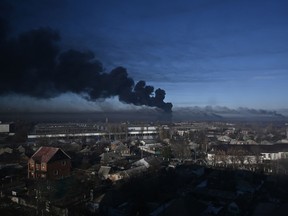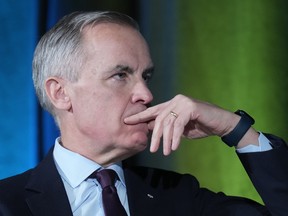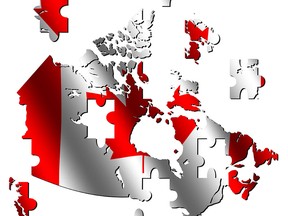Kevin Carmichael: Canadian companies haven’t had to seriously think about political risk for decades. There’s no longer any avoiding it
Article content
History was over, they said, when Prime Minister Justin Trudeau, Global Affairs Minister Mélanie Joly, Alberta Premier Jason Kenney and all the other generation Xers in positions of power today were forming their world views in the 1990s.
Advertisement
This advertisement has not loaded yet, but your article continues below.
Article content
If any naivety from the grunge years lingered at the start of this week, it’s gone now.
Trudeau, 50, responded to Russia’s invasion of Ukraine with sanctions that were straight from the Cold War. Among them was a ban on exports to Russia of minerals, aerospace goods and information technology; in other words, essentially anything that Canada mines or makes that Russians might want to buy. The government also cut off a list of Russian financial institutions and individuals from the Canadian banking system.
“It is a moment of grave danger,” Finance Minister Chrystia Freeland said at a press conference in Ottawa alongside Trudeau, Joly and Defence Minister Anita Anand. Freeland, who worked in Ukraine and Russia as a journalist in the 1990s, said she feared for the future of the rules-based order that was stitched together in the aftermath of the Second World War. “This is an extremely serious challenge to that order,” she said. “We can’t let that happen.”
Advertisement
This advertisement has not loaded yet, but your article continues below.
Article content
The federal government put the value of the trade sanctions at $700 million, which Trudeau acknowledged was relatively small, reflecting Canada’s withering economic ties with Russia since Putin annexed Crimea in 2014.
The prime minister emphasized the importance of Western allies acting in unison, so Canada’s sanctions were meant to ensure there would be no cracks in a common front that so far includes the United States, the European Union, Japan, the United Kingdom, Australia and New Zealand.
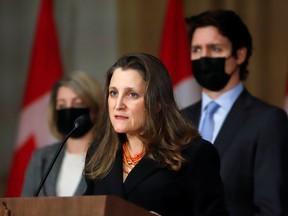
Canada has been a beneficiary of the postwar order held together by the dominance of the U.S., its closest trade partner. We wouldn’t have had a chance if the Great Powers were always out for themselves. But in a world governed by rules such as those overseen by the World Trade Organization, and etiquette set by outfits like the G20, a smallish country can avoid being bullied. That brings stability and plenty of market access, which Canadian companies and investors have used to great effect, generating wealth that would otherwise be difficult to create.
Advertisement
This advertisement has not loaded yet, but your article continues below.
Article content
The downside of stability, unfortunately, is complacency. Canadian companies haven’t had to seriously think about political risk for decades, and some may never have thought about it. There’s no longer any avoiding it.
The trade war initiated by former U.S. president Donald Trump interrupted the recovery from the Great Recession. China’s jailing of Michael Kovrig and Michael Spavor demonstrated that Canada’s second-largest trading partner was actually a risky place to do business. Now, there’s a war on the eastern fringe of the European Union, the other major destination for Canadian exports and investment.
“Politics is the most difficult job on Earth,” Stephen Poloz, the former Bank of Canada governor, told the Financial Post’s Larysa Harapyn this week.
Advertisement
This advertisement has not loaded yet, but your article continues below.
Article content
“When it becomes a country issue, it becomes geopolitics, as we’ve seen with the U.S. and China. Now we have Russia against the world, in effect, with these aspirations around Ukraine,” he continued. “It’s like any other major shock. We need to understand it in real time.”
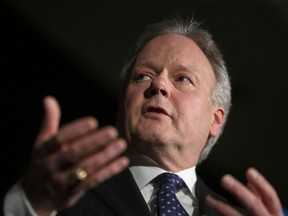
Traders and analysts appeared to struggle to put a price on the latest geopolitical shock. European natural gas prices surged 70 per cent, given the continent relies on Russia for much of its supply. The main benchmarks for oil jumped above US$100 per barrel, then dropped back after U.S. President Joe Biden spared the Russian energy industry from U.S. sanctions, at least for now. Wheat prices in Chicago rose to their highest since 2012, as Russia and Ukraine are big exporters of the commodity.
Advertisement
This advertisement has not loaded yet, but your article continues below.
Article content
North American stock markets initially plunged, then traders bought the dip, deciding international sanctions weren’t as severe as some had been expecting. Bonds, gold and the U.S. dollar all rose as investors sought havens.
Royal Bank of Canada’s chief risk officer, Graeme Hepworth, said the country’s biggest bank did not have any “meaningful” exposure to either Russia or Ukraine, but it could be buffeted by second-order effects.
“On one hand, Canada’s a net exporter of natural resources, and that’s a positive for the economy,” he said, referring to the upward pressure on commodity prices because of the conflict. “On the other hand, those things are going to continue to fuel and exacerbate … current risk concerns like inflation. And so those would be the areas of concern that we would be focused on in this environment.”
Advertisement
This advertisement has not loaded yet, but your article continues below.
Article content
Canadian potash producers could be beneficiaries. Russia and Canada accounted for 31.8 per cent and 20 per cent, respectively, of potash production in 2020, according to Natural Resources Canada. Companies such as Saskatoon-based Nutrien Ltd. could stand to gain if Russia and its allies become pariahs in the U.S. and Europe.
-

David Rosenberg: The Russians aren’t coming, they’ve arrived — here’s what could happen next
-

Russia’s invasion of Ukraine strands food, metal shipments as ports, railways close
-

Ukraine crisis puts East Coast LNG back on the map
“We cannot predict the specific impact that the conflict will have on our business, but we are aware that it likely means diminished volumes of potash, nitrogen and phosphates for the global market at least in the short term,” Nutrien Ltd. said in a statement, adding it intended to increase production of all three.
Advertisement
This advertisement has not loaded yet, but your article continues below.
Article content
Kinross Gold Corp.’s Kupol mine is located in eastern Russia, far from the Ukraine border, and represents the company’s most profitable mine, accounting for 21 per cent, or 511,000 ounces, of its 2.4 million gold ounces in 2020. That number is expected to drop to 13 per cent in 2022.
The company in a statement on Feb. 23 said it did not expect any impact from U.S. sanctions because its workforce was primarily local, the mine was well-stocked and it had the flexibility to sell gold within the country.
“Kinross has successfully operated in Russia for more than 25 years and has previously managed through similar situations while complying with applicable laws,” the miner said.
Global miners are used to political risk because of the nature of their business. That used to make them unique in Canada. Now, they’ll be giving lessons.
• Email: kcarmichael@postmedia.com | Twitter: CarmichaelKevin
Advertisement
This advertisement has not loaded yet, but your article continues below.
The gen-Xers running Canada just got a wakeup call from Putin
2022-02-24 23:37:31


